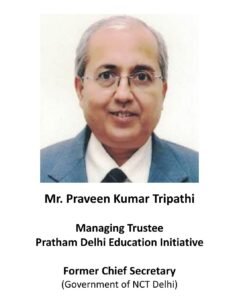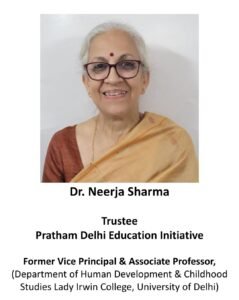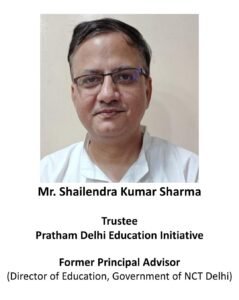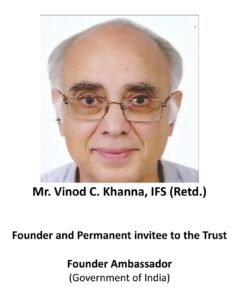About Us
History
The Pratham movement was launched in Mumbai in 1994 by Dr. Madhav Chavan & Ms. Farida Lambay in collaboration with Municipal Corporation of Greater Mumbai and UNICEF. This grew to a national network of Pratham-like initiatives in different parts of the country. In 1999-2000 Pratham spread to other cities including Delhi, Vadodara, Ahmedabad, Patna, Pune, Allahabad, and Bangalore. Today, Pratham is an all-India movement across 23 states and 4 union territories.
Pratham Delhi Education Initiative (PDEI)was launched by Mr. Vinod Khanna, a former member of Indian Foreign Service in 1999. Mr. Khanna was supported in his efforts by Pratham Mumbai and a small group of volunteers from varied backgrounds in Delhi. The ICICI Ltd. and the HPS Foundation (a development support organization set up by HCL Perot Systems) extended generous support to the initiative.

The first meeting of the newly constituted board of Pratham Delhi Trust was held on March 25, 2000 at Narula’s Hotel, Connaught Place. It was chaired by Mr. Vinod Khanna and was attended by Mr. LalitNarula, Ms. Brinda Singh, Mr. Vinay Shankar, Mr. P.P Chauhan, Dr. Venita Kaul, Mr. B.G. Varghese; Ms. RamniNarula was represented by Mr. Sandeep Bakshi. Ms. ManjuBharatram, Dr. R. Govinda and Mr. Shahid Mahdi had also given their consent to join the Trust and it was decided that all the Trustees shall reassemble on April 22, 2000 at the same place to sign the Trust deed. Thus, Mr. Vinod Khanna was designated as the first Managing Trustee and Mr. LalitNarula the first Treasurer of Pratham Delhi Education Initiative Trust.
The first full executive group consisting of Mr. Vishal Sehgal, Mr. SaurabhJohri, Ms. Maninder Kaur, Ms. Namita Gupta and Ms. Mary Biswas attended the third meeting of the PDEI Trust held for the first time at its registered office, provided by ICICI bank, at NBCC Place, BhishmaPitamah Marg, New Delhi on September 26, 2000. The meeting was chaired by Prof. R. Govinda.
Reflections…after 22 years…and way forward…
Pratham Delhi now completed 22 years; formed as part of the larger Pratham network, sharing the mission of “Every Child in School…and Learning Well”. Pratham Delhi’s strategy is to attain the goals evolved over years in response to the problems at the grass-root level. During the founding years, the key issues were:
1.An almost non-existent preschool structure in underprivileged communities.
2.Significant proportions of children in 3-14 years age group were out of schools in underprivileged areas.
In other words, access was a huge factor both at preschool and at primary schooling level. Accordingly, Pratham’s response was to set up large scale community-based preschool centres referred to as Balwadis for underprivileged children in 3-5 years age group. This has been the most consistent program since the setting up of Pratham Delhi Trust.
The magnitude and significance of the two issues reduced over the next few years, though differently, offering different kind of challenges. The change that has come about in terms of access can be attributed to several factors working concurrently. Thus, access to preschool, other than Pratham’s effort, is due to the downward extension of early childhood classes in local primary schools, initiative of parents- consciously or out of necessity, expansion of Anganwadi networks, etc. Similarly, reduction in out of school numbers can be attributed to the success of SarvaShikshaAbiyan (SSA) and simultaneous effort of other non-government organizations as well.
Thus, the focus of Pratham during the last few years has shifted from out of school to in school and more particularly to the classrooms. Prior to that, Pratham Delhi, as part of its retention support strategy, entered the municipal schools and found huge gaps in the expected and actual learning level of children. This gap was manifested by the following facts:
1.Large proportion of children in different grades could not read a simple text of grade II difficulty level.
2.Large proportion of children in different grades could not recognize numbers or attain slightly higher level of mathematical competency.
In response to this situation, Pratham team developed a process of accelerated reading pedagogy. It was the immediate requirement in order to demonstrate to the parents of first-generation school goers that children are indeed learning something in school before they lose confidence in school. From the child’s point of view, learning to read was an attempt to equip them with the basic skill to handle the regular class curriculum.
Board of Trustees







Our Team

Jajaluddin (J.D. SONU)

Vijay Kumar

Krishna Kumari

Madhu

Poonam Bandooni

